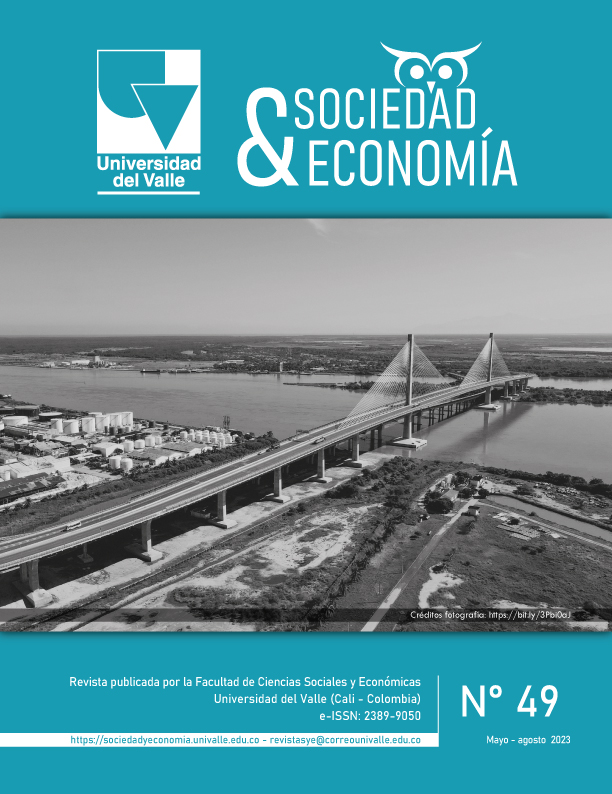The Concept of Development: Heuristic Turns. From Economic Growth to The Rights Approach
Keywords:
concept of development, growth, income distribution, underdevelopment, rights-based approachMain Article Content
The concept of development has changed over time, reflecting different theories and approaches to the problem of human welfare. This article aims to present and analyze these changes, which can be seen as heuristic turns: shifts in perspective that offer new ways of understanding and addressing the issue of development. The methodology used is a review of the most significant turning points in the history of development thinking. The result is a distinction between three main perspectives: the view of development as a process of economic growth and convergence; the view of development as a response to the challenges of underdevelopment and heterogeneity; and the view of human rights as a normative framework for development. The first two perspectives focus on the mechanisms that enable or hinder development, while the third one tries to define what development means in terms of human dignity and well-being, and how to design public policies that promote it.
Acemoglu, D. y Robinson, J. A. (2012). Why Nations Fail. The Origins of Power, Prosperity, and Poverty. Crown Publisher. https://doi.org/10.1355/ae29-2j
Cardoso, F. H. (1977). La originalidad de la copia: la CEPAL y la idea de desarrollo. CEPAL. https://doi.org/10.18356/02cca210-en
Cardoso, F. H. y Faletto, E. (1969). Dependencia y desarrollo en América Latina. Siglo XXI.
CEPAL –Comisión Económica para América Latina y el Caribe–. (2001). Equidad, desarrollo y ciudadanía. Editorial Alfaomega.
Descartes, R. (2020). El Discurso del Método y Meditaciones Métafísicas. Espasa.
Domar, E. (1979). Expansión de Capital y Crecimiento. En A. Sen (Comp.), Economía del Crecimiento (pp 62-72). FCE.
Esping-Andersen, G. (1990). The Three Worlds of Welfare Capitalism. Princeton University Press. https://doi.org/10.1177/095892879100100108
Freijeiro, M. (2005). Ciudadanía, derechos y bienestar: un análisis del modelo de ciudadanía de T.H. Marshall. Universitas, (2), 63-100.
Germani, G. (1962). Política y sociedad en una época de transición, de la sociedad tradicional a la sociedad de masas. Editorial Paidos.
Harrod, R. F. (1979). La teoría dinámica. En A. Sen (Comp.), Economía del Crecimiento (pp 43-62). FCE.
Huberman, L. (1965). Nosotros el pueblo. Una historia socialista de los Estados Unidos. Editorial Palestra.
Jefferson, T. (1776). Declaración de Independencia de los Estados Unidos de América. https://archivos.juridicas.unam.mx/www/bjv/libros/6/2698/22.pdf
Kuhn, T. (1971). La estructura de las revoluciones científicas. FCE.
Kuznets, S. (1955). Economic Growth and Inequality. The American Economic Review, 45, 1-28.
Lastra, F. (2018). La superexplotación de la fuerza de trabajo y la especificidad del capitalismo latinoamericano: un aporte al debate. Izquierdas, (38), 257-278. https://doi.org/10.4067/S0718-50492018000100257
Lewis, A. W. (1963). El desarrollo económico con oferta ilimitada de trabajo. Tecnos.
Marini, R. (1973). Dialéctica de la Independencia. Ediciones Era.
Marshall, T. H. (1997). Ciudadanía y clase social. REIS: Revista Española de Investigaciones Sociológicas, (79), 297-346. https://doi.org/10.2307/40184017
Marx, C. (2014). El Capital. Crítica de la Economía Política. FCE.
Mcpherson, C. (2005). La teoría política del individualismo posesivo. Trotta.
Menna, S. (2014). Heurísticas y metodología de las ciencias. Mundo Siglo XXI, IX(32), 67-77.
Millán, H. (2022). Infraestructura y enfoque de derechos: hacia una definición. Hasto Hnini: Revista de Paisajes y Espacio Construido, 1(2), 1-11. https://doi.org/10.47386/2022V1N2IEDHM
North, D. (1993). Instituciones, cambio institucional y desempeño económico. FCE.
Nurkse, R. (1963). Problemas de formación de capital en los países insuficientemente desarrollados. FCE.
OCDE –Organización para la Cooperación y el Desarrollo Económicos–. (2013). Iniciativa ¿Cómo va la vida? https://www.oecdbetterlifeindex.org/es/#/11111111111
O´Donell, G. y Schmitter, P. (1986). Transitions from Authoritarian Rule: Tentative Conclusions about Uncertain Democracies. John Hopkins University Press.
Piketty, T. (2014). Capital in the Twenty-First Century. The Belknap Press of Harvard University Press. https://doi.org/10.4159/9780674369542
Pinto, A. (1973). Heterogeneidad Estructural y modelo de desarrollo reciente de la América Latina. En Raíces Estructurales de la Inflación (pp. 104-140). FCE.
Prebisch, R. (1998). El desarrollo económico de la América Latina y algunos de sus principales problemas. En CEPAL, Cincuenta años del pensamiento de la CEPAL: textos seleccionados (pp. 63-129). FCE; CEPAL.
Rawls, J. (1971). Teoría de la Justicia. FCE.
Rebelo, S. (1991). Long Run Policy Analysis and Long Run Growth. Journal of Political Economy, 99(3), 500-521. https://doi.org/10.1086/261764
Ricardo, D. (1998). Principios de economía política y tributación. FCE.
Rodriguez, O. (1980). La teoría del subdesarrollo de la Cepal. Siglo XXI.
Rojas, M. (2014). El Estudio Científico de la Felicidad. FCE.
Romer, P. M. (1986). Increasing Returns and Long Run Growth. Journal of Political Economy, 94(5), 1002-1037. https://doi.org/10.1086/261420
Ros, J. (2001). Development Theory & The Economics of Growth. University of Michigan.
Ros, J. (2013). Rethinking Economic Development, Growth & Institutions. Oxford University Press.
Rosenstein-Rodan, P. N. (1943). The Problems of Industrialisation of Eastern and South-Eastern Europe. The Economic Journal, 53, 202-211. https://doi.org/10.2307/2226317
Rostow, W. W. (1990). The Stages of Economic Growth: A Non-Communist Manifesto. Cambridge University Press. https://doi.org/10.1017/CBO9780511625824
Sala-I-Martin, X. (2000). Apuntes de crecimiento económico. Antoni Bosch.
Sen, A. (2000). Desarrollo y libertad. Planeta.
Smith, A. (1994). La Riqueza de las naciones. Alianza Editorial.
Solow, R. (1956). A Contribution to the Theory of Economic Growth. Quarterly Journal of Economics, 70(1), 65-94. https://doi.org/10.2307/1884513
Sunkel, O. y Paz, P. (1975). El subdesarrollo latinoamericano y la teoría del desarrollo. Siglo XXI.
Downloads

This work is licensed under a Creative Commons Attribution-NonCommercial 4.0 International License.
Revista sociedad y economía editada por la Facultad de Ciencias Sociales y Económicas de la Universidad del Valle se encuentra bajo una Licencia Internacional Creative Commons Atribución - No comercial 4.0
Basada en una obra en http://sociedadyeconomia.univalle.edu.co

